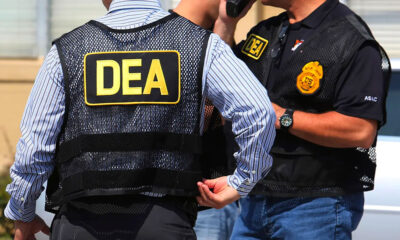
Legal
Canadian City Supports Exemption for an Unlicensed Dispensary
A ground-breaking British Columbia dispensary that has been operating for 20 years is challenging the national crackdown on Canada’s “gray-market” dispensaries.
Weeks after being raided by British Columbia’s provincial police, one of the province’s oldest cannabis dispensaries received backing from local lawmakers, with a vote to support a special exemption originating from the Victoria city government. The exception could allow the dispensary to remain open without the license mandated by Canada’s Cannabis Act, but it remains to be seen if the decision will be honored by provincial and national authorities.
The Victoria Cannabis Buyers Club has been supplying thousands of local patients with medical cannabis for over 20 years, and bills itself as Canada’s “oldest compassion club.” Since 1996, it has openly purveyed cannabis products from its storefront on Johnson Street in downtown Victoria, BC’s capital near the southern tip of Vancouver Island.
But it is one of many dispensaries in Canada that were operating in a legal “gray area” before passage of the Cannabis Act in 2018, and have since been subject to a crackdown. It’s been something of a perverse irony that “legalization” in Canada has meant raids and closure for many dispensaries — even in areas where there aren’t enough licensed ones to meet local demand. This southwest corner of British Columbia is definitely one of those areas.
The VCBC was raided on the morning of Nov. 14 by the provincial police force known as the Community Safety Unit, for being out of compliance with BC’s Cannabis Control & Licensing Act. The police seized a range of inventory. No arrests were made, and the store was able to re-open — but was now clearly under threat.
On Jan. 8, in response to the raid, the VCBC and its supporters held a protest outside the offices of BC Finance Minister Carole James, who oversees implementation and enforcement of the cannabis regulations in the province.
“We want to convince the government that it’s in their best interest to grant us a temporary exemption so that we can continue our work and work with the government towards becoming fully compliant with the law,” VCBC founder Ted Smith told CTV News at the protest.
“At this point, the provincial government hasn’t responded other than their official rhetoric that we’re not in compliance with the law and that’s why we’re being shut down,” Smith said. “But their responses on paper have been things like, ‘our patients are not aware of the safety of the products because they’re not as tested as Health Canada’s products.'”
Smith said that the dispensary was not getting complaints from patients about irregular products.
However, while provincial bureaucracy remained unyielding, the local municipal authorities were swayed. At a meeting the very next morning, Victoria city councilors voted unanimously to support the exemption.
As the local cannabis news site Mugglehead reports, the resolution commits Mayor Lisa Helps to pen a letter requesting that the provincial government allow the VCBC to continue providing “responsible access and a safe, welcoming community space for medical cannabis users.”
Medical Marijuana Pioneers Left in the Cold
As the Victoria Times-Colonist reports, the VCBC is the oldest of many dispensaries that have survived precariously in the legal “gray area” of Canada’s medical marijuana industry. The club was among those that waged legal battles with the federal government over access to medical marijuana — financed in part by sales of $25 “Cannabonds,” redeemable with a quarter-ounce of high-grade bud after a favorable decision.
The VCBC’s legal efforts were responsible for a landmark 2015 decision in which the Supreme Court of Canada ruled that cannabis extracts such as oils and edibles may be used as medicine.
Other such legacy dispensaries in the area are also getting raided. On Dec. 18, the Hammond Compassion Society in the Vancouver suburb of Maple Ridge was raided by police. Municipal authorities were quick to wash their hands of the matter.
“What they’re doing is taking away the supply to everyone in Maple Ridge,” town councilor Gordy Robson complained to the Maple Ridge News, explicitly referring to provincial authorities.
The Grass Roots Medicinal Cannabis dispensary in Squamish was likewise raided by the police in November. It was forced to close, and provincial authorities have launched forfeiture proceedings against it. Another Squamish dispensary, 99 North, was shut down in a raid as well — despite the fact that it had a pending license application.
Comfort Coming to Kootenays?
Ironically, all this is happening as John Horgan, who leads British Columbia’s legislature, is talking a big game about province’s old-school cannabis economy.
“I remember being in Amsterdam and seeing all of the BC bud awards that were being given out at the time when the product was illegal, and it’s ironic we seem to be having more Ontario product being distributed in BC through the legal market,” Horgan said at a press conference last month. “We in BC have a legendary product and that’s not making its way to the legal market.”
Horgan said that the legislature was “going to continue to work as best we can to ensure that the consuming public gets a quality, safe product, and that we reap the benefits that we can of having a long tradition of cultivating cannabis here in BC.”
And indeed, in November, the BC government provided $675,000 to help illicit cannabis growers in the Kootenays — the mountainous southeastern region of the province — enter the legal market. The idea is to help the region’s estimated 2,500 growers become registered craft cultivators.
But Ted Smith, perhaps not surprisingly, is skeptical of such efforts, charging that BC’s regulatory regime has allowed large-scale licensed producers to dominate the market.
“They’re destroying the whole concept of BC bud with what they’ve done,” Smith told the Victoria News after Horgan’s press conference. “If they were interested in helping they would not only have done a lot more to make sure that small growers could easily get licenses, but they would also be having coffee shops and places where people could come and smoke the product.”
Correction: This article has been amended to note that the city has supported an exemption. A previous draft stated incorrectly that they had granted an exemption.
TELL US, do you think more places should allow gray market dispensaries to operate?


























